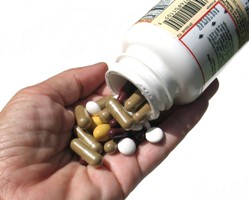 Are you bad to your bones? There is a growing trend in the United States and Canada: calcium and vitamin D deficiency. Bone mass reaches its peak around age thirty so calcium and vitamin D are critical in helping you to prevent breaks or fractures down the road. As important as strong muscles are to your overall health, bones are what hold us together. Otherwise we’d just be a puddle on the ground. I’m hoping I can shed some light on all the benefits that calcium and vitamin D have to offer.
Are you bad to your bones? There is a growing trend in the United States and Canada: calcium and vitamin D deficiency. Bone mass reaches its peak around age thirty so calcium and vitamin D are critical in helping you to prevent breaks or fractures down the road. As important as strong muscles are to your overall health, bones are what hold us together. Otherwise we’d just be a puddle on the ground. I’m hoping I can shed some light on all the benefits that calcium and vitamin D have to offer.
What is vitamin D and why do I need it?
Vitamin D is key in helping to produce strong bones. It also helps absorb calcium from the intestines so that is why you find so many products with the two in combo. The current recommendation depends on age, but for a woman age 18-30 you are looking at around 600 internal units (IUs) per day. Our bodies naturally convert vitamin D into a usable form from midday sun (between 10 am and 2 pm). People like me who live in northern parts of the world and get to see old man winter usually do not get enough midday sun to make our own vitamin D.
What is D3?
I get asked this question at least once a day. No, it’s not anything to do with the Mighty Ducks. Vitamin D3, aka cholecalciferol, is a natural form of vitamin D. It is made when our skin is exposed to midday sun. Ergocalciferol or D2 is found in food. Food sources of vitamin D are mostly dairy products like milk, but if you are lactose intolerant you may want to try some other options like egg yolk, liver, salmon, tuna, and sardines.
 What about Calcium?
What about Calcium?
Your body is constantly trying to have equilibrium between the amount of calcium in your bones and blood. If it’s too low in the blood it will pull it out of the bones, so that is why it is important to supplement if you do not get enough from your diet. Again for a woman 18 to 30 years old, the typical dose of calcium is 500 mg twice daily. Some calcium products like Oscal (calcium carbonate) are absorbed better when taken with food. Make sure you are drinking plenty of water and eating lots of fiber- filled foods because calcium can be constipating.
There can be too much of a good thing with calcium and vitamin D. Some of the side effects of too much include kidney stones and renal failure. If you have problems swallowing pills, there are some products that are easier to swallow like petites, gummis, and Viactiv or Caltrate soft chews in some yummy flavors.
There are some other benefits from calcium and vitamin D other than just with bones. In women, vitamin D has been shown to reduce the risk of breast cancer while calcium has been shown to lessen symptoms of PMS and there is ongoing research into their use in decreasing incidences of other forms of cancer like prostate and colon. If you just don’t like milk or are lactose-intolerant it might be worth taking a calcium and vitamin D supplement. It could save you from having to wear a bulky cast or miss that 5K you’ve been training for.
